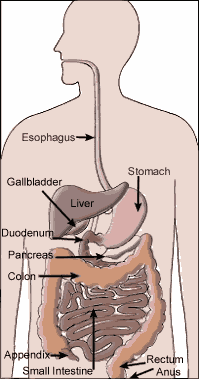Constipation - To go, or not to go . . .
That is no longer the question!
Constipation is a symptom, not a disease. It is more common as you age, but constipation affects nearly everyone in our modern day. Women tend to report constipation problems more than men, about two to three times more often. Mostly, constipation is temporary and not serious.
There are some basic choices that apply for healthy bowel function. One of these choices includes a diet rich in high fiber foods. The health benefit of a high fiber diet is that people who eat plenty of fiber-rich foods are less likely to become constipated.
Not eating enough high fiber foods and not drinking adequate amounts of fluids are some of the main causes for constipation. Other causes include lack of exercise, certain prescription medications, chemotherapy treatments, some diseases and stress. Lifestyle changes such as pregnancy, aging and traveling may cause constipation. It might also occur when the urge to have a bowel movement is too often ignored. Pay attention to nature’s call.
If there are fewer than 3 movements weekly for an extended period of time, constipation may be diagnosed. It can continue for weeks or longer for some people. Straining during bowel movements or a feeling of incomplete elimination may also be considered constipation.
|
There seems to be no true definition that works for everyone. Many people believe they are constipated when, actually, their bowel movements are normal. There is no correct number of daily or weekly bowel movements. For some people, normal can be three times a day or three times a week. Stools can vary, normal being soft or firm. Sales of over-the-counter laxatives is big business. Many of these laxatives are not needed and some are even harmful. There are four kinds of laxatives available. Bulk-forming laxatives, such as Metamucil and Citucel, makes the stool softer and easier to eliminate. Stimulant laxatives, such as Ex-Lax and Correctol, cause the intestinal wall to contract. Lubricant laxatives, such as mineral oil, soften the stool. Saline laxatives, such as Milk of Magnesia, increase the salt concentration within the stool.
 |
|
No need to push hard!
Generally, people are not too concerned with mild or transitory symptoms of constipation. However, for some people it can be very bothersome. When dietary and lifestyle changes don't relieve constipation, and laxatives are of little benefit, there are other more intensive treatments available. They range from bowel retraining, suppositories, enemas, and sometimes even, surgery.
Complications can occur, such as hemorrhoids due to severe straining or by stretching the sphincter muscles causing a fissure. This may lead to bleeding identified on the surface of the stool. Fissures are usually painful and can aggravate the constipation that caused them. Sometimes, straining causes a small portion of intestinal lining to push out from the rectal opening known as rectal prolapse. In younger children and older adults, there is more of a tendency for partial blockage due to hard stools known as fecal impaction.
There may be areas of the colon that are narrow or certain growths in the colon that aggravate the condition. These more serious causes should be diagnosed and treated by a physician, if the constipation persists. If diverticulitis is present, the adjustment of dietary fiber intake may help to prevent more damage over time. The amount of fiber intake should be discussed with your doctor.
Click here for a comprehensive listing of
for most people . . .
a well-balanced diet that includes fiber-rich foods such as unprocessed bran, whole-grain bread, and fresh fruits and vegetables can lessen the chances of constipation. Drinking plenty of liquids and getting regular exercise promotes intestinal activity.
Remember to increase fiber gradually to avoid uncomfortable bloating or gas. The digestive system needs time to adjust.Try to drink at least eight glasses of water a day as this helps fiber soften and bulk-up waste, which promotes regularity. High-fiber diets increase stool size, which naturally helps prevent constipation. Caution: without a good deal of fluids, fiber might stall and bring about constipation.
For the bowels to regulate properly, a lifelong daily high fiber intake of 25-30 grams is the required goal. Learning about the causes of constipation will help lead to its prevention and treatment. Constipation does not happen overnight, so one cannot expect that constipation can be overcome just by eating one bowl of fresh fruit salad. The high fiber food choice, however, is a step in the right direction.
